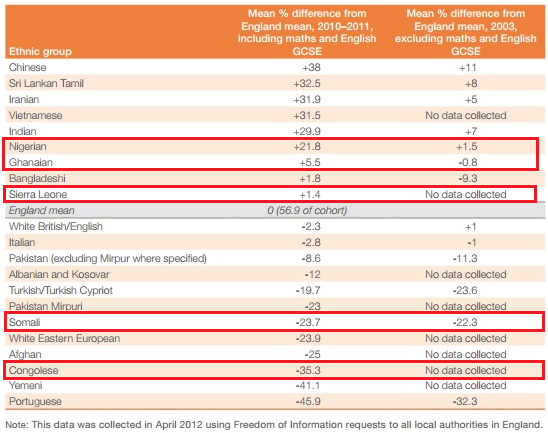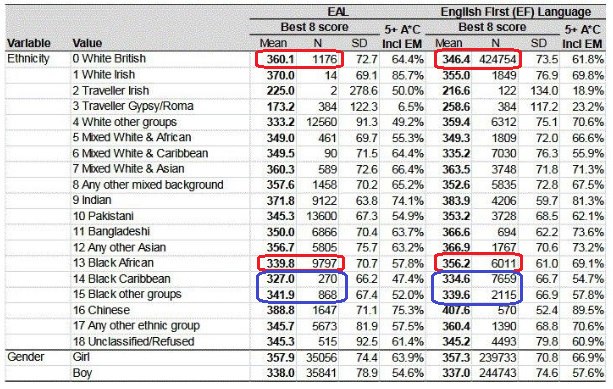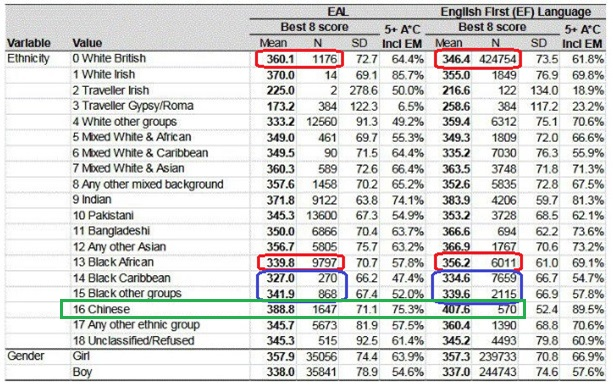Refuting Chanda Chisala
Posted By Spencer J. Quinn On In North American New Right | Comments Disabled3,709 words
Zambian scholar Chanda Chisala wants us to believe that racial differences do not explain the IQ gap [2]. He claims that “environment explains the entire IQ gap” between the races, and that the evidence he offers constitutes “a total refutation of the race hypothesis” in intelligence and psychometric research. He does not deny racial differences, but seems to believe that such differences are in truth too superficial to use as measuring sticks to rank different races without taking environment into account. According to him, under optimal environmental conditions “when no one faces any significant detrimental assaults,” the races will rank differently (and presumably much more closely) than they do today. That he claims to be a race realist [3] who allows for differences in average intelligence across the races while rejecting racial determinism in IQ makes his position both unique and baffling.
Regardless, Chisala’s attack on the race hypothesis warrants serious consideration. He deserves attention in this matter partially because he forgoes the standard Leftist tactics of accusing his opponents of racism [4], or demanding that the race hypothesis meet an unreasonably high bar [5], or simply refusing to talk about it [6]. (Not that I am calling Chisala a Leftist; I have no idea what he is politically). Chisala also stands out from other egalitarians because he actually brings data to the table, and his data shows how black African students actually outperform British whites in the UK in their Best 8 GCSE [7] scores. GCSE stands for General Certificate of Secondary Education and, according to Infogalactic, “is an academically rigorous, internationally recognised qualification awarded in a specified subject, generally taken in a number of subjects by pupils in secondary education in England, Wales and Northern Ireland over two years (three years in certain schools).”
So far, Chisala’s opponents have been quibbling over Chisala’s practices as well as the nature of the GCSE itself. For a quick rundown, Lance Welton at VDARE accused Chisala of manipulating and misrepresenting [8] his data, something that Chisala strenuously denies. Neither, however, makes explicit enough what’s going on. In his 2018 Unz Review article, “A Troublesome Intelligence? [9],” Chisala chides Charles Murray for including Caribbean blacks in his UK racial analysis given that such blacks “have much lower scores than black Africans.” He then writes:
When broken down into different African nationalities, it becomes clear that even the relatively small 8 IQ point racial gap observed in favor of British whites does not exist. The Black-White performance gap is completely eradicated, and in fact appears somewhat reversed, when you just look at children from African countries that speak English.
In my opinion, Chisala is rigging the game in his favor. He’s not manipulating the data since he’s being up front about his methods, but that doesn’t mean the game isn’t rigged. Put bluntly, he wants to toss out a population of dumb blacks so that he can keep only a population of smart blacks in an effort to refute the IQ hereditarians. He also changes the definition of the debate. This is all about racial IQ gaps, not national IQ gaps. So if it is all about race, why should we care about “different African nationalities”? He says it’s because African blacks who come from nations where English is spoken tend to outperform African blacks who don’t. Well, sure, but what Chisala doesn’t mention is that black Caribbeans also appear in his data, separated by the English-speaking divide – and they perform poorly on either side of it (as do other non-African blacks). If Chisala is going to make hay over “blacks” from English-speaking backgrounds being super-smart, he must include Caribbean and other blacks in his analysis or give up all this talk about race (or prove that non-African blacks are somehow not black). After all, the subtitle of his response to Lance Welton is, “Why Do Blacks Outperform Whites in UK Schools?”, not “Why Do Certain African Blacks from Certain African Countries Outperform Whites in UK Schools?” This second subtitle would be more honest given Chisala’s research and arguments.
Instead, Chisala would rather talk about race when it suits him, and then talk about nationalities when it suits him. Note how he does not afford the white kids the same latitude. Imagine if a similar researcher were to say, “Well, the white kids from Region X are largely descended from a group of whites that historically haven’t been very smart, whereas the white kids from Region Y are simply brilliant just like their ancestors. So let’s drop the Region X kids from our analysis in order to make whites as a whole look better.” That would be an absurd tactic because race is race; you take the good with the bad, as well as the smart with the dumb. But Chisala doesn’t do this because it would run counter to his anti-hereditarian agenda.
Welton objects to Chisala’s conclusions in other ways as well. He points out that immigrants tend to self-select for intelligence, thereby being more likely to represent the best rather than the worst of a race. Chisala disputes this fairly well, in my opinion, but I would like to read Welton’s counter-argument whenever it comes. Chisala in particular makes some interesting points regarding regression towards the mean and how African IQs may be higher than they seem. One should read Chisala’s Unz article [2], Welton’s response [8], and Chisala’s response to his response [2] to get caught up on this fascinating debate.
Welton also states that the GCSE is not an IQ test, and that measuring the Best 8 scores doesn’t always give an accurate picture of a child’s aptitude since these scores won’t necessarily include “hard” fields like math and English, and instead could include mostly “soft” fields like art or physical education. Chisala gets around this by claiming that
[m]y easy refutation of this claim was to present the group scores in GCSE Math (and GCSE English) separately. The Africans in questions outscored the British whites even in those “hard” GCSEs.
The problem here is that Chisala does not include this data in either article I’ve linked (or maybe I just somehow missed it). His Unz Review article does present black African scores in Math and English, but fails to compare them to the white scores. The link to his source data, which was compiled by Steve Strand of Oxford University, appears to be broken.
Chisala does provide a table in his response to Welton, however, which shows how Nigerians (who outscored the English mean by 21.8 percent in the GCSE) outscored the English mean by only 1.5 percent when excluding the math and English portions of the GCSE. But he admits that the table is hardly conclusive given that scores from other African nationalities either did not swing as dramatically or were not collected sans math and English:
Regardless of whatever faults exist or don’t exist with Chisala’s methods or his data, I’m willing to refute him while accepting his arguments at their strongest. I will assume for argument’s sake that the outstanding black African scores had not been inflated or doctored in any way, even though that sort of thing does happen [11]. I will also assume that Chisala is correct about everything he claims and still save the racial hereditarian position. I will do this using three main tacks:
- By presenting a more complete picture by including all blacks taking the GCSE.
- By showing how Chisala sets the bar of success too low to be persuasive.
- By demonstrating that Chisala’s single-minded focus on the black-white gap limits the reach of his arguments and dooms them to fail.
Presenting a More complete Picture
Here is the data that Chisala relies upon for his thesis. The figures supporting his rather specific claim that black Africans outperform British whites are circled in red, while the figures that would help lead to a broader racial conclusion are circled in blue:
The columns under EAL (English as an Additional Language) refer to kids who either don’t speak English well, learned it late, or come from households, communities, or countries where English is typically not spoken. The header to the right, “English First (EF) Language,” speaks for itself. First, we notice the N counts: 6,011 African blacks outperforming 424,754 British whites. Okay, so the sample size of the former group should be a lot larger in order to provide a comprehensive picture of African intelligence. This must cast a shadow of doubt on all of Chisala’s assertions which rely on this figure. Regardless, we’re stuck with the data we have, and we can’t fault Chisala for that.
Secondly, if we include the other black scores in the EF column, we come away with a different picture. In this data set, we have 15,785 blacks taking the GCSE who are proficient in English. Arithmetic shows us that ((6011×356.2)+(7659×334.6)+(2115×339.6))÷15,785=343.5.
Thus, the overall average black score on the GCSE is 343.5. That’s still pretty good, but not nearly as stellar as Chisala lets on, and definitely not higher than that of British whites. Further, if we are going to group all the blacks together, we should do the same with the whites. This will add 1,849 white Irish and 6,312 other whites with average scores of 355 and 359.2, respectively, resulting in a moderate boost of 0.2 to the overall white average. Even including the 122 Traveller Irish, the white average remains 346.6 after rounding.
So in fact, “blacks” do not “outperform whites in UK schools,” as Chisala claims. To be fair, Chisala in his response to Lance Welton remembers to specify British whites when comparing them to the EF Africans, so the specific claims he makes are correct – but his article’s sub-heading isn’t. Furthermore, it’s misleading given that the headlines are typically all that people are going to read, anyway.
Still, this can be seen as a victory for the anti-hereditarians in that the scores are so close. For a race that supposedly has a fifteen-to-thirty-IQ-point deficit compared to whites to score so closely with them is remarkable. Doesn’t this refute the racial hypothesis anyway?
Well, not so fast.
Setting the Bar of Success Too Low
Right away in his Unz Review article, Chisala tells us where he’s placing his goal posts. Certainly, he doesn’t move them in the way he accuses Welton of moving his, but by placing them so low and wide apart, he’s making his conclusions out to be less impressive than they really are.
He starts with a pair of quotes from psychologist and famous race hypothesis supporter Richard Lynn (emphasis Chisala’s):
If a multiracial society is found where these race differences in intelligence are absent, the evolutionary and genetic theory of these differences would be falsified. Those who maintain that there are no genetic differences in intelligence between the races are urged to attempt this task.
And (emphasis mine):
If only environmental factors were responsible for the different IQs of different populations, we should expect to find some countries where Africans had higher IQs than Europeans. The failure to find a single country where this is the case points to the presence of a strong genetic factor.
So you see where this is going. Richard Lynn, the stalwart defender of the race hypothesis, issues a challenge from on high to find a single instance in which Africans have higher IQs than Europeans and then claims that under such circumstances, “the evolutionary and genetic theory of these differences would be falsified.” Chanda Chisala then says, “Game on!” and manages to find one instance in which a small subset of black children outperform a much larger subset of white children on a series of exams.
Does this mean that Chisala refuted the race hypothesis in IQ? No. It means he refuted an unwise and arrogant statement made by Richard Lynn. Congratulations to Chisala on that. Supporters of the race hypothesis needed to be shaken out of their complacency, and Chisala did so. My heartfelt thanks goes out to him – no kidding, it does. But that doesn’t mean the race hypothesis is wrong. Here’s why.
Chisala makes the race hypothesis out to be more universal than it really is. It all really boils down to that. He paints the race hypothesis as an all-or-nothing affair. And after showing how the “all” part of it fails, he leads us by the nose to his conclusion: nothing – as in, race has nothing to do with IQ. Observe:
Remember, the more universal your claim, the more it can potentially be falsified by a simple singular unambiguous event, which is why Lynn was right to give such a simple falsifying standard. It is not the complex confirmatory data that is critical for a hypothesis; it is the potentially disconfirmatory data.
If you hypothesize that all swans are white, it doesn’t matter how “overwhelming” the number of white swans you’ve observed in the past is; it will take only one black swan – no pun intended – to falsify your universal hypothesis.
Chisala’s mistake should become clear now. The race hypothesis was never so universal as to say that all whites are smarter than all blacks, or that average white intelligence will always and everywhere exceed black average intelligence. The race hypothesis does not even entirely rule out environmental factors in determining IQ. But the race hypothesis must do all of these things if Chisala’s “singular unambiguous event” is to falsify it.
In reality, the race hypothesis merely posits the strong racial component behind average intelligence, hardly a universal claim. When dealing with averages under any circumstances, of course there will be outliers: a group of women who happen to be taller than a group of men, for example, or the occasional black swan among the white ones. In no way does the race hypothesis rule out a group of very smart blacks living in close proximity to a group of average whites. Such a scenario could very well happen, and under a confluence of extremely fortuitous events (coincidental or not), may have happened recently in England. There are around a billion black people on the planet; even with a low average IQ, their standard deviation should tell us that there will still be a large number of intelligent blacks on the far end of their bell curve.
Here is a series of thought experiments may further illustrate the paucity of substance in Chisala’s position (and, yes, I’m paying homage to The Onion from back when it was funny over fifteen years ago):
- Point: Blacks make superior basketball players to whites. Find me one majority-white starting team that wins the NBA championship, and my claim will be falsified!
- Counterpoint: The 1980s Boston Celtics.
- Point: Blacks make superior sprinters to whites. Find me one white sprinter who can clock a 100-meter dash in under ten seconds, and my claim will be falsified!
- Counterpoint: Christophe Lemaitre, 2010.
- Point: Men make superior chess players to women. Find me one woman who can defeat the highest-rated man, and my point will be falsified!
- Counterpoint: Judit Polgar, 2005.
In all cases, the initial point never gets refuted. The vast majority of data we have points to black superiority in basketball and sprinting and male superiority in chess. The counterpoints refute only the ridiculous challenge following each point – which, if you think about it, is fairly arbitrary. Suppose Richard Lynn had said the following (with my edit in italics):
The failure to find at least three countries where this is the case points to the presence of a strong genetic factor.
Would Chanda Chisala have even written his articles had Lynn said this? Certainly, this would have forced him to place his goalposts a lot higher and closer together (and note these are Lynn’s goalposts, not Chisala’s). He would have had to work much harder to pose a serious challenge to the race hypothesis – and all because of a couple sentences one man once jotted down or said before a crowd. It seems that Chisala is missing the bigger picture here. Scientists should be verifying theories against data in the natural world, not verifying cherry-picked statements from a single man down to the letter. One feat is a lot more impressive than the other.
And speaking of impressive, in order to truly refute the race hypothesis, Chisala has to produce evidence on a scale that rivals the vast volume of psychometric data we’ve been collecting for around a century. He has 6,011 African blacks that outperform British whites on a series of exams (or 15,785 blacks that nearly equal them). On the other hand, the IQ hereditarians in America have millions of blacks who consistently underperform [13] against their white counterparts in standardized tests, and have been doing so since the tests were first administered. And remember, these blacks speak English and live in one of the wealthiest nation in the world. This means we can toss much of Chisala’s environmental concerns out the window when it comes to American blacks. In 2014, it was shown that Black America enjoys the forty-fourth highest per-capita GDP [14] in the world when adjusted for purchasing power. This is only fifteen points [15] and nine thousand dollars below that of the UK and well above countries such China, Russia, and all African nations south of the Sahara. Yet American blacks always do poorly on their standardized exams, and it doesn’t matter if it is the IQ test, the SAT, the GRE, the MCAT, the LSAT, or what have you. Every single psychometric measure we have says the same thing.
Here is Michael Levin saying as much in his 1997 classic Why Race Matters (emphasis mine):
The main scientific evidence of black/white differences in intelligence is black and white performance on standardized intelligence tests. Competent authorities agree that, as measured by the Wheeler Adult Intelligence Scale, the Wechsler Intelligence Scale for Children, the Raven’s Progressive Matrices, and similar instruments, the mean IQ of whites exceeds that of American blacks by about one white standard deviation. When IQ is scaled so that the white mean is 100 and the SD is 15, the black mean is about 85 and the black SD slightly less than 15. (Sternberg 1994: 899-907). This difference was first observed during the World War I, and has remained fairly constant.
The most thorough survey of the literature through 1966 is Shuey’s The Testing of Negro Intelligence (1966), which reports 382 comparative studies involving 80 different tests administered to hundreds of thousands of black and white children, high school and college students, military personnel, civilian adults, deviates, and criminals. The average black score in these studies was a bit below 85 and the average white score a bit above 100, with the difference in the means in the various studies ranging from 12 to 18 points.
And since 1997, very little has changed – otherwise Kevin Drum of Mother Jones wouldn’t be calling the black-white testing gap both real and a disgrace [16] like he did in March 2019.
Bottom line: Blacks don’t do as well as whites. It’s not even close. Even wealthy blacks do poorly in comparison to whites. Blacks don’t do as well as Hispanics in their standardized tests, and one would be hard-pressed to prove that the circumstances of American blacks are any worse than that of Hispanics (who in many cases speak English as a second language). Are we to pretend that none of this is true simply because 6,000 black kids in England know how to buck a trend? Are we to just look the other way because Richard Lynn once said something a tad foolhardy?
I don’t think so.
Demonstrating Chisala’s Single-Minded Focus on the Black-White Gap
I’ve saved my easiest and strongest argument for last.
There is one aspect of Chisala’s data set that no one is talking about: the Chinese. Below is the previous table of test scores with the Chinese scores highlighted in green:
Note how the Chinese EAL score is significantly higher than that the EF score of both British whites and black Africans. Note further how the Chinese EF score towers over all the others. If this isn’t a slam-dunk for the racial hypothesis, I don’t know what is. Are the environments of both black Africans and British whites in the UK that much worse than those of Chinese kids who have not yet mastered English to explain such an enormous gap? To say yes would be ridiculous. There is simply no explanation other than a racial one when accounting for Chinese success on the GCSE.
Of course, the Chinese N count of 570 EF students is tiny – but not as tiny as the black African N count relative to the British white one. Again, arithmetic: 6,011÷424,754=0.014. This means that the number of black Africans taking the GCSE is only 1.4 percent of the number of British whites. Meanwhile, 570÷6,011=0.094. This means that the number of Chinese taking the GCSE is a whopping 9.4 percent of the number of black Africans. So if Chisala is not concerned about the low N of black Africans compared to that of British whites, he should not be concerned about the low N of the Chinese compared to that of the black Africans.
We should always remember that this isn’t Montgomery, Alabama in 1962, where the only races that warrant discussion are black and white. Further, no researcher or writer should enter this debate to defend the honor of his race. Psychologists like Richard Lynn aren’t stirring up a pot of home cooking when ranking the races by intelligence (otherwise, they wouldn’t ascribe the highest average IQs to the Asians). Instead, they’re applying the racial hypothesis in IQ to all races, and have found time and time again that it has real predictive power. Race is deep, and race is real – and not just with regards to intelligence. Races differ greatly in terms of temperament and behavior as well, greatly enough to make big differences on standardized exams.
Chanda Chisala’s objection to this reminds me of how twentieth-century physicists were able to find minute ways in which Isaac Newton’s laws of motion fail, especially when attempting to predict the position and velocity of electrons. This marked an important moment in the history of quantum mechanics and has kept physicists busy ever since. But this does not mean that physicists should simply do away with Newton in the same way Chisala wants to do away with people like Richard Lynn. Newton might not be able to predict the motion of sub-atomic particles, but he sure can predict whether a football will sail through goal posts.
And so can the race hypothesis.
Spencer J. Quinn is a frequent contributor to Counter-Currents and the author of the novel White Like You [18].



